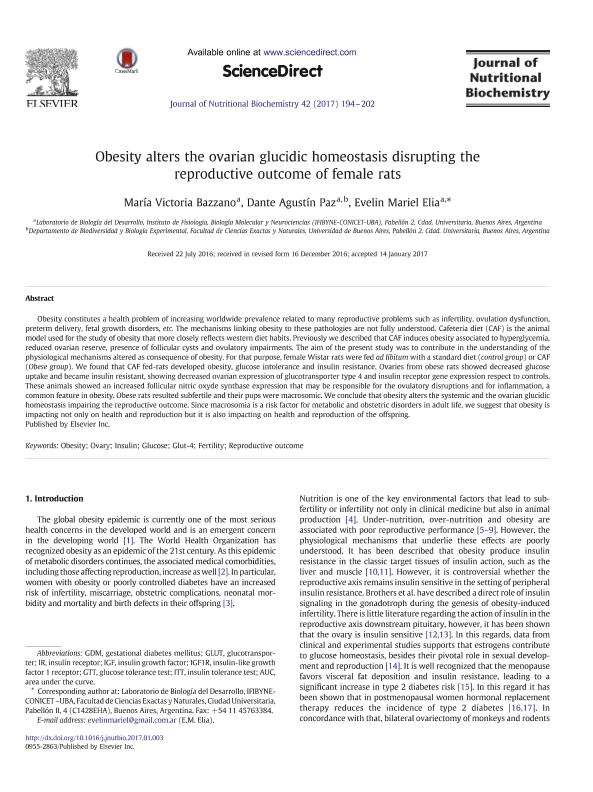Artículo
Obesity alters the ovarian glucidic homeostasis disrupting the reproductive outcome of female rats
Fecha de publicación:
04/2017
Editorial:
Elsevier Science Inc
Revista:
Journal Of Nutritional Biochemistry
ISSN:
0955-2863
Idioma:
Inglés
Tipo de recurso:
Artículo publicado
Clasificación temática:
Resumen
Obesity constitutes a health problem of increasing worldwide prevalence related to many reproductive problems such as infertility, ovulation dysfunction, preterm delivery, fetal growth disorders, etc. The mechanisms linking obesity to these pathologies are not fully understood. Cafeteria diet (CAF) is the animal model used for the study of obesity that more closely reflects western diet habits. Previously we described that CAF induces obesity associated to hyperglycemia, reduced ovarian reserve, presence of follicular cysts and ovulatory impairments. The aim of the present study was to contribute in the understanding of the physiological mechanisms altered as consequence of obesity. For that purpose, female Wistar rats were fed ad libitum with a standard diet (control group) or CAF (Obese group). We found that CAF fed-rats developed obesity, glucose intolerance and insulin resistance. Ovaries from obese rats showed decreased glucose uptake and became insulin resistant, showing decreased ovarian expression of glucotransporter type 4 and insulin receptor gene expression respect to controls. These animals showed an increased follicular nitric oxyde synthase expression that may be responsible for the ovulatory disruptions and for inflammation, a common feature in obesity. Obese rats resulted subfertile and their pups were macrosomic. We conclude that obesity alters the systemic and the ovarian glucidic homeostasis impairing the reproductive outcome. Since macrosomia is a risk factor for metabolic and obstetric disorders in adult life, we suggest that obesity is impacting not only on health and reproduction but it is also impacting on health and reproduction of the offspring.
Palabras clave:
Fertility
,
Glucose
,
Glut-4
,
Insulin
,
Obesity
,
Ovary
,
Reproductive Outcome
Archivos asociados
Licencia
Identificadores
Colecciones
Articulos(IFIBYNE)
Articulos de INST.DE FISIOL., BIOL.MOLECULAR Y NEUROCIENCIAS
Articulos de INST.DE FISIOL., BIOL.MOLECULAR Y NEUROCIENCIAS
Citación
Bazzano, María Victoria; Paz, Dante Agustin; Elia, Evelin Mariel; Obesity alters the ovarian glucidic homeostasis disrupting the reproductive outcome of female rats; Elsevier Science Inc; Journal Of Nutritional Biochemistry; 42; 4-2017; 194-202
Compartir
Altmétricas




